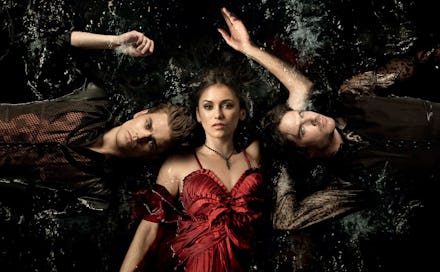What the CW Network Can Teach Us About Class Warfare

The CW has always been a network about teen power. Once dedicated to celebrating the lives of the 1% with shows like Gossip Girl and the revamped 90210, the network has refocused its brand on the lives of the supernatural with shows like The Vampire Diaries and its spin off The Originals, Supernatural, Beauty and the Beast and The Tomorrow People.
It would be easy to dismiss these shows as nothing more than a shrewd business move meant to capitalize on a current trend in young adult fiction. But while it is impossible to understate the CW's financial motives in gambling on such a lineup of shows, the genre's appeal to the CW audience goes deeper. Mired in a recession and facing a particularly rough job market, the young adult fantasy and science fiction genres act as a new metaphor for discussing inequality and even class warfare for millennials.
'Gossip Girl.' Image credit: CW via Fashionista
In shows like Gossip Girl, 90210, Fox's The O.C. and ABC's Revenge, the power dynamic between individual characters is typically dependent on money — a concept that has been prevalent in young adult fiction ever since movies like Cruel Intentions and the Skulls hit the big screen. The protagonist, with whom the audience is suppose to connect, is a poor (relatively speaking) outsider from the wrong side of the tracks, and is shut out by all but a few of the wealthy elites who control the school's social scene.
The teen fantasy genre flips these conceits on their head by creating a power dynamic between characters based on their respective supernatural abilities, which are either earned or awakened. In the Vampire Diaries, as in Buffy the Vampire Slayer (which aired on CW's predecessor the WB), the main characters' powers isolate them from their friends and push them to the fringes of society. The conflict is no longer between the haves and have nots, but rather between the master and the neophyte, as our heroes fight older vampires, skilled witches and powerful demons who comprise a cabal of elites who use their power to control normal humans.
'The Vampire Diaries.' Image credit: CW via Fanpop
The Vampire Diaries includes characters of all classes and species, creating an interesting dynamic between humans and non-humans — as well as real-world relevance. Both are at the mercy of powerful superiors who can wipe their minds clean (information control) and kill without repercussions (a certain Texas teen who avoided jail because he suffers from affluenza comes to mind).
A recent survey sponsored by the American Psychological Association revealed that stress levels among young adults aged 18 to 33 has increased significantly more than it has amongst older Americans. The survey found that the top stressors for millennials are work and money, cited by 76% and 73% respectively. The fantasy and sci fi genres offer young people facing an uncertain future a way to digest the world around them and also to escape from it.
Thus it takes no stretch of the imagination to see why a show such as Agents of S.H.I.E.L.D., which follows a government agency of superheroes and super geniuses protecting humans from powerful unknown forces, is appealing when people's confidence in the government is at an all time low, in part due to the world being changed by the forces of technology.
In a post recession world filled with a seemingly endless barrage of talk of class warfare, the popularity of the fantasy genre among young adults should be no surprise. The Vampire Diaries and shows like it provide a space for millennials to explore the changing power dynamics of our society and the uncertainty we face through myth and symbols — themselves far more interesting and revealing than anything written about on Gossip Girl.